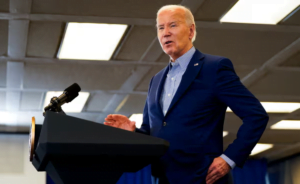Papua New Guinea: Controversy Erupts Over Biden’s Papua New Guinea Cannibalism Remark Amid Criticism and Official Records
During a campaign speech, U.S. President Joe Biden spoke about his uncle, 2nd Lt. Ambrose J. Finnegan Jr., who went missing in World War II after his plane crashed near Papua New Guinea. Biden suggested his uncle may have fallen victim to cannibalism, but official records state the aircraft suffered engine failure and crashed into the Pacific Ocean, with no evidence of such claims. His remarks sparked backlash in Papua New Guinea, where experts criticized them as misleading and insensitive.
Political scientist Michael Kabuni clarified that while historical cannibalism existed in ritualistic contexts, it was not an indiscriminate practice targeting outsiders. Governor Allan Bird downplayed the comments, seeing them as outdated rather than malicious, but economist Maholopa Laveil argued they further damaged Papua New Guinea’s global image. Critics noted that Biden previously canceled a visit to the country, making the remarks even more unfortunate.
Given the U.S.’s current efforts to strengthen ties with Papua New Guinea, the statement raised concerns about its diplomatic impact. The controversy highlights the need for world leaders to be mindful of historical accuracy and cultural sensitivities.

Papua New Guinea: Controversy Erupts Over Biden’s Papua New Guinea Cannibalism Remark Amid Criticism and Official Records
During a recent campaign stop in Pittsburgh, U.S. President Joe Biden recounted a story about his uncle, Ambrose J. Finnegan Jr., a World War II soldier whose plane reportedly crashed in Papua New Guinea. Biden suggested that his uncle’s remains were never recovered, hinting at the possibility of cannibalism in the region at the time. However, his remarks have sparked scrutiny and backlash, particularly from Papua New Guinea, where leaders and experts have called them misleading and offensive.
Official Records Contradict Biden’s Account
According to U.S. military records, Finnegan’s aircraft, an A-20 Havoc bomber, suffered engine failure and plunged into the Pacific Ocean near New Guinea’s northern coast on May 14, 1944. Three crew members, including Finnegan, were lost at sea, while one survived. The Defense POW/MIA Accounting Agency, which tracks missing service members, has no evidence linking Finnegan’s disappearance to cannibalism. Instead, the incident is documented as a tragic wartime accident. While Biden’s anecdote may have been personal, it conflicts with historical data, raising questions about the accuracy of his narrative.
Papua New Guinea’s Strong Response
The implication of cannibalism sparked immediate criticism from Papua New Guinea. Michael Kabuni, a political science expert at the University of Papua New Guinea, clarified that while cannibalism historically existed in certain cultural rituals, it was never a random or widespread practice. He explained that such acts, when they occurred, were tied to spiritual beliefs, such as honoring ancestors, and were not directed at outsiders like soldiers. Kabuni also dismissed the idea that cannibalism explains the many WWII soldiers still missing worldwide, emphasizing that thousands remain unaccounted for due to the chaos of war, not local traditions.
Local Leaders Express Mixed Reactions
Responses within Papua New Guinea varied. Allan Bird, governor of East Sepik Province, reacted lightheartedly, attributing Biden’s comment to outdated stereotypes rather than malice. He humorously noted that the president’s remarks might stem from old Hollywood movies that inaccurately portrayed Pacific Island cultures. However, others took a harsher stance. Maholopa Laveil, an economics lecturer, argued that Biden’s words risked harming the nation’s global image, especially after the U.S. leader canceled a planned visit in 2023—a move seen as a diplomatic snub. Laveil stressed that even casual comments from powerful figures can undermine diplomatic progress, particularly as Papua New Guinea seeks stronger international partnerships.
Diplomatic Tensions and Historical Sensitivity
The controversy comes at a delicate time. The U.S. has been working to strengthen ties with Papua New Guinea to counter China’s growing influence in the Pacific region. Last year, the two nations signed a defense cooperation agreement, reinforcing their strategic alignment. However, Biden’s remark has raised concerns about cultural insensitivity and historical ignorance. Critics argue that perpetuating stereotypes undermines mutual respect, a key element of successful diplomacy.
Why This Matters
Biden’s story, though likely intended to honor his uncle’s service, highlights the importance of factual accuracy when discussing sensitive historical topics. For Papua New Guinea, the incident is a reminder of how colonial-era myths continue to persist, overshadowing modern realities. The country, rich in cultural diversity and natural resources, has long fought against reductive portrayals that fail to acknowledge its complex history and contemporary achievements.
Moving Forward
Leaders and scholars in Papua New Guinea have called for greater awareness and education to dispel harmful myths. Kabuni urged foreign officials to engage with local historians and communities to better understand the region’s past. Meanwhile, Laveil emphasized that bilateral relationships require consistent respect and effort, not just high-level agreements.
For the U.S., this episode serves as a cautionary tale. As global powers compete for influence in the Pacific, cultural competence and historical accuracy remain crucial. Missteps in rhetoric can alienate allies, complicating efforts to address shared challenges such as climate change and regional security.
In conclusion, while Biden’s remarks may have been rooted in family lore, they inadvertently revived painful stereotypes. Addressing this requires acknowledging historical truths and fostering dialogue grounded in mutual understanding. For Papua New Guinea, the focus remains on moving beyond outdated narratives and asserting its place in global affairs as a nation worthy of respect and partnership.
Check out TimesWordle.com for all the latest news
You must be logged in to post a comment.